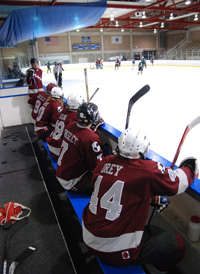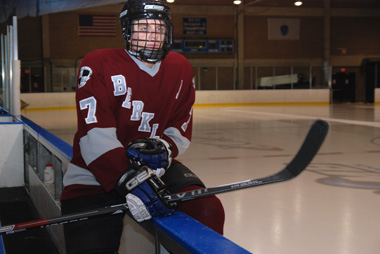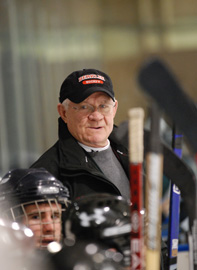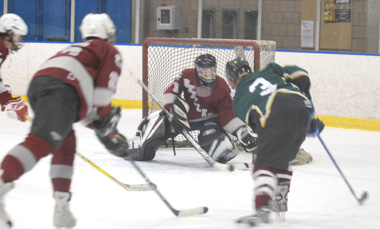Berklee Hockey: Cool Cats

The Berklee IceCats cheer on their teamates at a game against the Boston Brawlers.
Phil Farnsworth

John Kingsley led the charge to create a hockey team at Berklee.
Phil Farnsworth

Retired Boston Bruin John "Pie" McKenzie coaches the IceCats.
Phil Farnsworth

The IceCats stop another puck as the Boston Brawlers, a local men's league team, attempt to score.
Phil Farnsworth
As the Zamboni machine circles the UMass Boston hockey rink, cleaning the ice, the chatter on the bench fluctuates from strategizing for the approaching game to upcoming gigs and CD releases. The Berklee IceCats have suited up for a game against the Brawlers, a men's league team, preparing to leave their world of ensembles and music theory behind for a few hours.
With each game, Berklee's hockey squad is establishing itself as a bona fide team instead of an apparent oxymoron.
"People in class would say 'What, Berklee has a hockey team?'" said John Kingsley, who can be credited with spearheading the creation of the team. "Now, they're like, 'You're on the hockey team?'"
By all accounts, the IceCats represent the most serious effort on campus to form a Berklee sports team. While soccer and softball teams have been formed, they did not last. In the words of Emily Page, Berklee's interim director of student activities, the IceCats are "in a league of their own."
"This is the most highly organized student-led athletic venture we've had," said Lawrence Bethune, vice president for student affairs/dean of students, a hockey fan and former hockey player. "We've embraced them."
Carving out their place
The steady media coverage—including segments on NPR's Only a Game and NESN, and a piece in the Boston Globe—has undoubtedly helped the team's cause and bolstered its image. Indeed, it was the Globe article that caught the attention of retired Boston Bruin John "Pie" McKenzie, prompting him to volunteer to coach the team, which didn't have any formal leadership at the time.
"They're coming along. This was a great game," McKenzie said after the IceCats crushed the Brawlers, 11-2, explaining that it was his girlfriend who saw the Globe story and encouraged him to help out the team.
The IceCats, meanwhile, appreciate what McKenzie has brought to the team. "We're not NHL prospects," Kingsley said. "He knows what he's dealing with. He wants us to have fun, play hard."
And that's exactly what the IceCats are doing.
Drawing from myriad levels of talent, the team has 25 players who all have at least two things in common: a passion for music and a love for hockey, a game they never expected to find at Berklee.
For many team members, choosing music over sports happened a long time ago. They embraced their path at Berklee, accepting the fact that organized athletics was not part of the program.
"Hockey was my main focus until the music thing kicked in," said center Ivan Chopik, a fourth-semester student majoring in music business/management and guitar performance. "I didn't expect there to be a hockey team here. I was one of the first members after I saw John's flyers."
For Chopik, the creation of the IceCats was a pleasant and welcome surprise.
"I've got the music thing 24/7. It's nice to be able to do sports. You can kind of release some energy in a different kind of way," said the 19-year-old, who originally hails from Moscow and now considers Coral Springs, Florida, his home base.
Burned out by some very competitive play early on, Matthew Pulomena said goodbye to hockey after his sophomore year in high school. "I found music in between," said the eighth-semester composition major who plays forward for the IceCats. "I did not step on the ice for seven years. I stopped until now. I was shocked when I found out I could play hockey at Berklee."
Evolution of a team
Growing up in Atlanta, Georgia, where football was the sport, hockey didn't figure in much for kids like Kingsley. But he did manage to get some ice time in, enough to spark a revival of that passion about a dozen years later at Berklee.
It was over winter break in 2005 that the seeds for the IceCats were planted for Kingsley, a music education and performance major. "I was at home and thinking it would be fun to play men's league hockey."
Back on campus after the break, Kingsley took action and hung up flyers inviting students to join a hockey league.
By last spring, a fledgling team had come together and began practicing on nearby outdoor tennis courts and on a hockey court in Boston's North End. The group also secured ice time through a former team member who worked at an ice rink west of Boston, and later through captain Jimmy Gately—then serving as the team's de facto coach—who got the IceCats a discount on ice time at a rink south of the city.
The IceCats' season officially kicked off in September 2006 with their first game.
The team is enrolled in the American Collegiate Hockey Association. But, as it is for all new teams, the IceCats must go through a probationary period; next season, they will be granted full status in the league and allowed to participate in championship tournaments.
For now, though, they take their newbie status in stride, including scrambling for ice time, and the resulting late-night practices.
"When I was growing up, I had to practice at 5:30 a.m.," said Emily Hochman, one of two women on the team and a fourth-semester professional music major from Montclair, New Jersey, whose funky attire has earned her the distinction as the team's fashionista. "Now, it's at the opposite end. I'd much rather stay up late than get up early," added Hochman, who plays defense for the IceCats.
With an undefeated collegiate record—as well as impressive standings against men's league teams and a win against the musician-based Boston Rockers—the team continues to gain momentum and a solid reputation. Still, it is working to find the right balance at a school known more for guitar picks than hockey pucks.
Berklee backing
The fact that the team even exists in the capacity that it does is a credit to Berklee's support, according to Kingsley.
"I honestly can't say enough for what the school has done," Kingsley said. "They've given us access to a lot of resources. All through the process, all they had to do was say no. They're letting us do this ourselves. They're letting us grow and develop as people, which is what college is all about."
In particular, Emily Page, Berklee's interim director of student activities, helped the IceCats take their game to the next level.
"I think it's important for a well-rounded student to experience," said Page, who, as a former competitive skier, appreciates the value of sports. "They should have the opportunity to participate in sports."
Indeed, while the IceCats represent the highest tier of athletic opportunities afforded to Berklee students, there are many other avenues students can explore—from intramural pick-up games on Sundays at Simmons College to organized team sports with Boston Ski and Sports Club to joining an Emerson College NCAA Division 3 team.
Page saw to it that the IceCats got some seed money, and credits the team, in part, for being a catalyst for the creation of a fundraising account within the student activities' budget. The team's own fundraising efforts, including ticket sales at intercollegiate games, will go into that fund.
Meanwhile, the Office of Institutional Advancement has thrown its support behind the IceCats, which may lead to the team's participation in a phonathon to raise money.
In addition, while a specified percentage of the sales at the Berklee Bookstore traditionally go to a general fund at the school, Berklee has agreed to give the team that percentage when it comes to IceCats merchandise.
Still, the team has to watch its wallet.
Not wanting to squander limited money on transportation, team members are on their own when it comes to getting to practices and games, relying on carpooling, Zipcars, cabs, and public transportation. The team counts on family for medical assistance and stat tracking. Cindy Silva, mother of IceCat Charlie Silva, brings a first aid kit to every game, where she and her son's fiancée, Mallory Jordan, keep track of the team's statistics.
Bethune hopes that the college can step up its role in supporting the team. "I would feel better if the school could help them more," he said. "We're trying to explore ways we can help them more."
The school's help notwithstanding, there's no getting around the role Kingsley played.
"John did a lot," Page said. "He beat down doors. His persistence paid off and he should really be commended for that."
In fact, Kingsley got a crash course in the business of sports while pursuing his dream.
"I just went at it with the tenacity of a little kid," Kingsley said.
Along with the school's blessing, students have rallied behind the IceCats and a newly created pep band is available to play at games.
"It gives the student body something to get behind, support, and be proud of, not that they're not already proud of Berklee," Kingsley said.
For love of the game, and music
Not only has Kingsley gained some real-world experience from launching the team, but he has also found that all the work has benefited him academically.
"Ever since I started playing hockey, my grades have gone up," said Kingsley, who also manages to fit in his own early-morning workouts at the Massachusetts Institute of Technology rink. "Playing hockey in the morning, it sort of gives me a center of balance, warms my mind up. I analyze things in my head without actually doing it."
Pulomena would agree.
"For me, it's something you can meditate about when you're in the middle of a game or practice," he said. "You're clean, free from thought, in the middle of the moment. It makes doing everything else better, all the music, all the writing."
And perhaps playing music and hockey aren't so different after all.
"There are the same challenges as playing music, but it's less abstract," Pulomena said. "There's something very comforting about that."
But while they are enjoying the chance to play a game they've long loved, the IceCats know that ice time will always come second to music, at least while they're at Berklee.
Said Kingsley, "The reality is, we're not going to be NHL players, as much as that's a pipe dream in everyone's mind right now. The reality of the situation is, we'll end up having a career in music."
